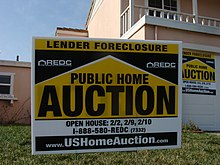
Back حبس الرهن Arabic Beslah BEW Execució d'hipoteca Catalan Tvangsauktion Danish Ejecución de hipoteca Spanish اجرائیه سند رهنی Persian Saisie immobilière (France) French עיקול HE Կատարողական վարույթ Armenian Penyitaan ID
The examples and perspective in this deal primarily with the United States and do not represent a worldwide view of the subject. (April 2019) |

Foreclosure is a legal process in which a lender attempts to recover the balance of a loan from a borrower who has stopped making payments to the lender by forcing the sale of the asset used as the collateral for the loan.[1][2]
Formally, a mortgage lender (mortgagee), or other lienholder, obtains a termination of a mortgage borrower (mortgagor)'s equitable right of redemption, either by court order or by operation of law (after following a specific statutory procedure).[3]
Usually, a lender obtains a security interest from a borrower who mortgages or pledges an asset like a house to secure the loan. If the borrower defaults and the lender tries to repossess the property, courts of equity can grant the borrower the equitable right of redemption if the borrower repays the debt. While this equitable right exists, it is a cloud on title and the lender cannot be sure that they can repossess the property.[4] Therefore, through the process of foreclosure, the lender seeks to immediately terminate (that is, literally foreclose any future use of) the equitable right of redemption and take both legal and equitable title to the property in fee simple.[5] Other lien holders can also foreclose the owner's right of redemption for other debts, such as for overdue taxes, unpaid contractors' bills or overdue homeowner association dues or assessments.
The foreclosure process as applied to residential mortgage loans is a bank or other secured creditor selling or repossessing a parcel of real property after the owner has failed to comply with an agreement between the lender and borrower called a "mortgage" or "deed of trust". Commonly, the violation of the mortgage is a default in payment of a promissory note, secured by a lien on the property. When the process is complete, the lender can sell the property and keep the proceeds to pay off its mortgage and any legal costs, and it is typically said that "the lender has foreclosed its mortgage or lien". If the promissory note was made with a recourse clause and if the sale does not bring enough to pay the existing balance of principal and fees, then the mortgagee can file a claim for a deficiency judgment. In many states in the United States, items included to calculate the amount of a deficiency judgment include the loan principal, accrued interest and attorney fees less the amount the lender bid at the foreclosure sale.[6]
- ^ Timiraos, Nick; Alan Zibel (2011-11-02). "Reviews Begin for Borrowers Disputing Foreclosures". Wall Street Journal. Archived from the original on 2014-12-27. Retrieved 2012-01-17.
- ^ "foreclosure | Mortgage, Repossession, Foreclosure Process Definition | Britannica Money". www.britannica.com. Retrieved 2023-08-22.
- ^ Britain, Great (1761). "Mortgage". Statutes at Large from the Magna Carta to 1761 in Great Britain. Mortgage.
- ^ BFP v. Resolution Trust Corporation, 511 U.S. 531 (1994).
- ^ Terrell v. Allison, 88 U.S. (21 Wall.) 289 (1875).
- ^ "Supreme Court of Missouri Upholds Lenders' Rights to Obtain Full Deficiency Judgment". The National Law Review. Armstrong Teasdale. 2012-04-23. Archived from the original on 2012-05-30. Retrieved 2012-06-13.
